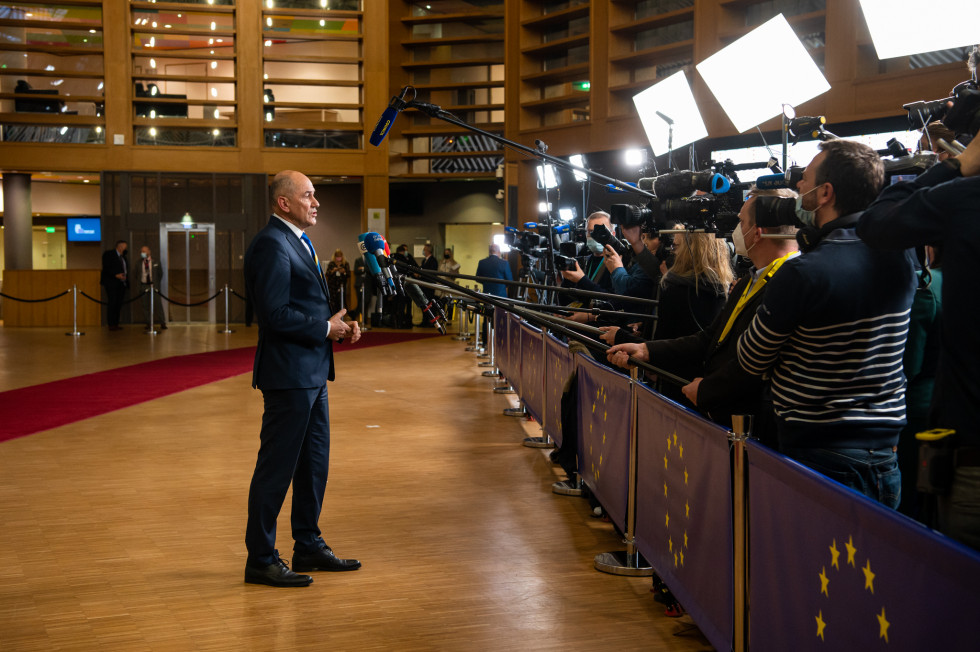Prime Minister Janša in Brussels: We must give Ukraine humanitarian, economic and military support
- Former Prime Minister Janez Janša (2020 - 2022)

PM Janez Janša made a statement to the foreign media. | Author Kabinet predsednika vlade
At the meeting, European leaders intend to discuss the security situation on the Russian-Ukrainian border, particularly regarding the latest developments, how to protect international law and conventions, what approach to take in relation to Russia and how to support Ukraine and its people in the future.
Upon his arrival, the Prime Minister made a statement to the foreign media, saying that the leaders had a very important meeting ahead of them. “First, we should help the Ukrainian government and people to defend themselves, we must give them humanitarian, economic and military support. Second, we must reach a decision regarding sanctions against the Russian authorities, where it is important that they understand that they will pay a high price for their aggression and that it’s not going to be like the sanctions upon their attack on Georgia and the occupation of the Crimea. And third, we must give Ukraine a real European perspective. It should happen by 2030 at the latest, which is why the Polish Prime Minister and I signed a letter to that effect and sent it to our colleagues and the President of the European Council,” said the Prime Minister, adding that they proposed the same approach to enlargement in relation to Georgia, Moldova and the Western Balkans. “The history of the last few decades should teach us that if the space of democracy, freedoms, respect for human rights and the rule of law is not enlarged, someone else will. We must learn from history, otherwise we will pay a heavy price,” said Mr Janša.
He added that, as a result of everything that was happening yesterday, there were only two signatories of the letter, but that other colleagues from Baltic countries and Central Europe expressed their support as well. Prime Minister Janša also supports the most severe sanctions possible against Russia because “it is not economic growth or inflation that is at stake, but human lives. People in Ukraine are dying because of a brutal Russian aggression”. When asked why sanctions had not been adopted yet, the Prime Minister responded that, as far as he knew, the package of sanctions was extensive and that it was being coordinated by the EU with its allies in the United States and around the world. “This is important if we want the sanctions to work,” he added.
“I was glad when I heard that Germany was withdrawing its support for the Nord Stream, but we have to go a step further. Today, we have woken up into a different Europe, a different world, and we must act in accordance with the new situation,” said the Prime Minister when asked about the Nord Stream.
“In the Cold War, the West won because of two things: the Free World organised its defence under NATO, which prevented the Communist regime from spreading across Western Europe. And the key victory happened through the system created by Western Europe, as a result of which people fled from East to West. That was the downfall of the Soviet regime. And that is exactly what Putin is afraid of, and it will happen when people compare their standard of living in a free Ukraine with the standard of living in Russia,” said the Prime Minister.
When asked about the beheading of Ukrainian authorities, the Prime Minister repeated the words of the Ukrainian Prime Minister who said that he was entirely certain that the real goal of Russian aggression was to decapitate the Ukrainian government and to install a puppet government. “But, as I said, the situation is different than in 2014. Ukraine is fighting and I hope that they persist and manage to defend themselves. Because if they don’t manage to defend themselves, and we have to help them defend themselves, even with weapons, then no sanctions that don’t include Ukraine’s European perspective will help. The time to act is now,” said the Prime Minister.
“We fear for the safety of all the people of Ukraine, including the government, because the government is clearly the target of this aggression,” said the Prime Minister when asked if he was worried about the fate of the Ukrainian President and Prime Minister. “I hope they are ready. Slovenia was in a similar situation 30 years ago, we know how they feel at the moment, so we talk about solidarity with Ukraine in a slightly different way than those without similar historical experiences. We hope that they remain safe, that they survive and that they win, and we will do everything in our power to help them,” the Prime Minister added.
He was also of the opinion that it is NATO that has to make the most important decision in this situation, namely to close the airspace over Ukraine, because “this will give Ukrainians more opportunities to defend themselves”.
Asked whether the recent negotiations of French President Macron with Putin were in vain, the Prime Minister said it is always good to negotiate, “because everything is better than war”. He concluded by saying, “Defeating Vladimir Putin in negotiations, however, is fairly wishful thinking, because when you go to Moscow, you have to know that there will always be a difference between words and deeds.”

